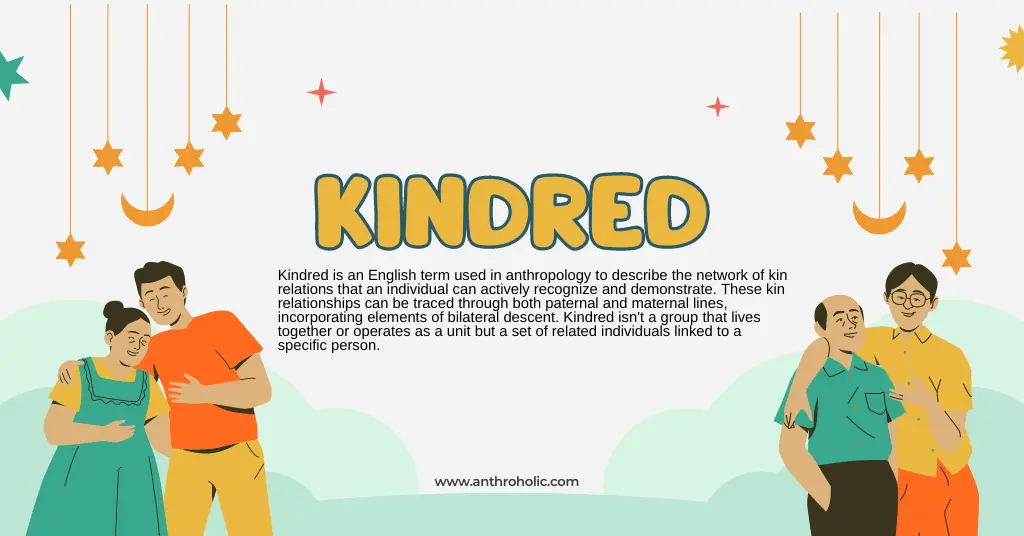AI Answer Evaluation Platform Live Now. Try Free Answer Evaluation Now
Kindred
Anthropology helps us make sense of the complexities of human social interactions. One of these complex structures, within the context of kinship, is the term “kindred.”

Defining Kindred
Kindred is an English term used in anthropology to describe the network of kin relations that an individual can actively recognize and demonstrate. These kin relationships can be traced through both paternal and maternal lines, incorporating elements of bilateral descent [1]. Kindred isn’t a group that lives together or operates as a unit but a set of related individuals linked to a specific person.
Structural Characteristics of Kindred
In traditional societies, kindred has a fluctuating membership and structure. The members of an individual’s kindred change as people marry, give birth, and die. The kindred of a child includes her parents’ kin, while the kindred of a married couple consists of each partner’s kin [2]
Unlike corporate descent groups, which have continuous existence and fixed membership, kindred is ego-focused, meaning it is identified relative to the position of each person [3]. For instance, while siblings share the same parents, each sibling has a unique set of kindred when you factor in in-laws from marriages.
Practical Implications and Examples
In societies where kindred plays a vital role, the individual often seeks support from different members of their kindred depending upon the situation [4]. An individual might turn to a maternal uncle for assistance with a political conflict, a cousin for a business partnership, or a paternal aunt for advice on marital issues.
For instance, in many traditional societies of Northern Europe, the concept of kindred was crucial during the Middle Ages, especially for nobility. Individuals often relied on their kindred for support in matters of warfare, politics, and economics [5].
Anthropological Interpretations
Anthropologists, particularly in the fields of social and cultural anthropology, have long recognized the significance of kindred as a key factor in structuring social relationships and influencing an individual’s interaction with society [6].
The concept of kindred has shaped various societal norms, traditions, and rituals, particularly in societies where individual autonomy is highly valued [3]. Understanding these kinship systems helps anthropologists decipher the cultural dynamics and social organization of different societies.
Conclusion
In conclusion, the anthropological concept of kindred underscores the importance of individual-centered kinship systems. Understanding kindred networks provides profound insights into the interplay of social relationships and cultural norms. As we continue to decipher the complex tapestry of human societies, the study of kindred remains an integral part of anthropological explorations.
References
[1] Kottak, C. P. (2006). Anthropology: The Exploration of Human Diversity. McGraw-Hill.
[2] Carsten, J. (2000). Cultures of Relatedness: New Approaches to the Study of Kinship. Cambridge University Press. https://doi.org/10.1525/ae.2001.28.3.690
[3] Sahlins, M. (2013). What Kinship Is-And Is Not. University of Chicago Press.
[4] Goody, J. (1969). Inheritance, Property, and Marriage in Africa and Eurasia. Sociology, 3(1), 55–76.
[5] Holy, L. (1996). Anthropological Perspectives on Kinship. Pluto Press.
[6] Schneider, D. M. (1984). A Critique of the Study of Kinship. University of Michigan Press.




